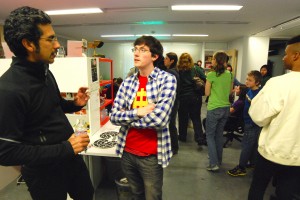Up One Prototyping
The following is the third in a 3-part series of posts by Tiltfactor student interns. Metadata Games is a NEH-funded open source project that uses games to help crowdsource archive and library holding tags. Here, interns Andrea and Viviana briefly describe their prototyping process for designing a competitive multi-player mobile game:
Our team was assigned with the task of creating a mobile, multiplayer metadata collection game that incorporates elements of fast paced competition and “one upping” your competitor. The catch is that we had to turn what worked as a competitive synchronous game into an asynchronous game. How would we enable players to form an exciting attachment to the game and be competitive with each other as each player interacted with the game over varying time spans? What would make players come back and play another round?


